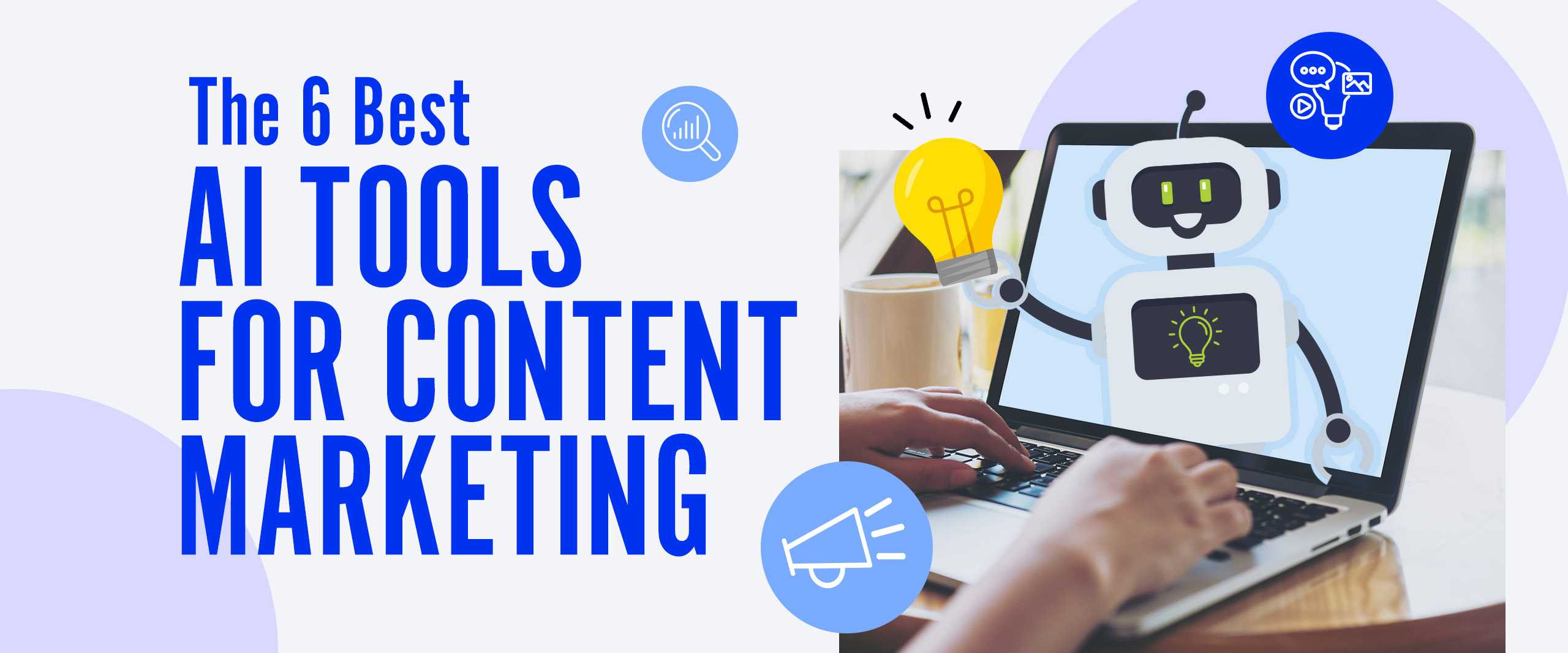Artificial Intelligence (AI) has been on the rise in the past few years, and one area where it’s changed the game is content marketing. For content marketers like myself, AI is not just a passing trend; it’s reshaping how we generate ideas, optimize for SEO, and scale content production.
Gone are the days of writer’s block, tedious research, and endless revisions. With advances in natural language processing algorithms, AI can generate articles, blog posts, and social media updates based on specific keywords or topics, streamlining content creation and saving valuable time.
Why AI Content Creation Tools Are Worth Considering
Here’s why these tools should be part of your content strategy:
- Saves Time: A typical blog post usually takes hours, not including proofreading and revisions. AI tools significantly speed up this process.
- Boosts Productivity: AI content generators streamline blog ideation, enabling quick social media posts and CTA creation.
- Cuts Costs: AI reduces the need for expensive freelance writers and eases the workload on internal teams.
- Scales Effortlessly: Creating and distributing content at scale takes time and money, but AI tools can automate processes for a more efficient approach.
- Enhanced SEO: AI tools simplify keyword research, provide optimization insights, and improve content quality without external support.
- Improves Quality: While AI content tools still require a human touch to ensure high-quality content, they are becoming more efficient, saving time for refining tone and context.
Whether exploring new topics, brainstorming concepts, or crafting visuals, AI tools have become a core part of my workflow. Here are six top AI tools marketers should use in 2025 to stay productive and creative.
- For Spelling and Grammar Checking: Grammarly
- For Content Ideas and Creation: ChatGPT
- For Organization and Note-Taking: Notebook LM
- For Web Search and Research: Perplexity.AI
- For SEO and Topic Research: Semrush
- For Image Creation: Whisk
1. GrammarlyIdeal For Spelling and Grammar Checking
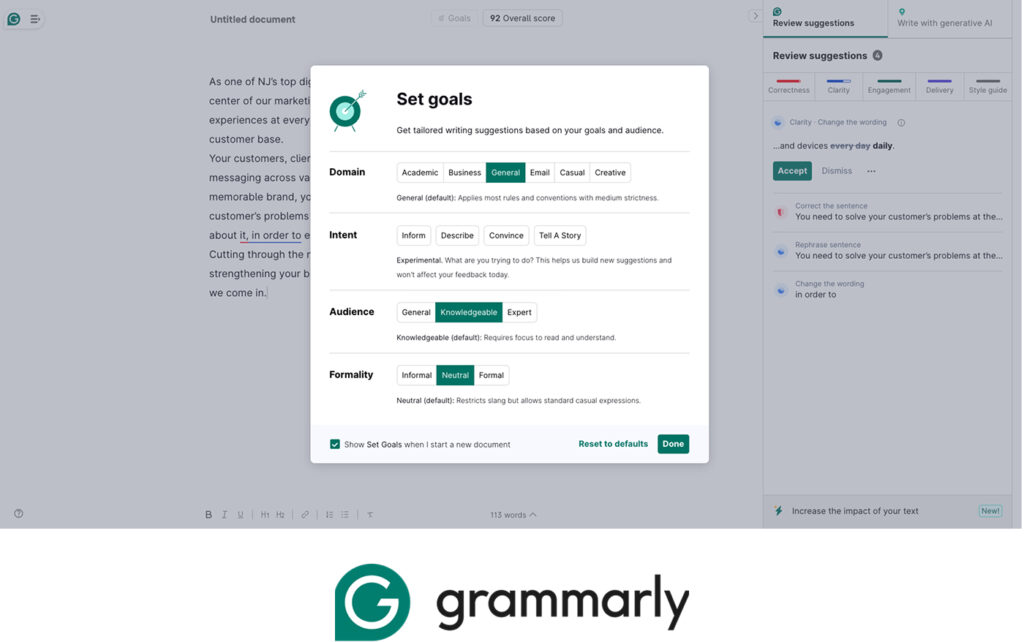
Great content starts with error-free writing. Grammarly is an AI-driven writing assistant that helps enhance spelling, grammar, and overall writing quality. It provides real-time suggestions to improve clarity, tone, and style, ensuring polished and professional content. Plus, it integrates seamlessly with Google Docs, Microsoft Word, and thousands of other apps and sites, so you can improve your writing wherever you work.
Pricing:
Grammarly offers a free version that offers basic grammar and spell-checking. However, there is a premium version that I highly recommend for any content marketer who is looking to improve their writing. For just $12 per user per month, you can access full-sentence rewrites, vocabulary enhancements, plagiarism detection, AI-generated writing prompts, and more.
Grammarly (Free Version)
Pros:
- Detects basic grammar, spelling, and punctuation errors
- Provides one-click correction suggestions
- Allows setting custom writing goals (Audience, Formality, and Tone)
- Identifies clarity issues and improves conciseness
Cons:
- Lacks advanced writing assistance, including plagiarism detection, citation support, sentence rewrites, and vocabulary enhancement
- No domain-specific goal settings (e.g., Academic, Business, Email, etc.)
- Excludes access to 2,000 monthly AI generative prompts and strategic writing suggestions
2. ChatGPTIdeal for Content Ideas and Creation
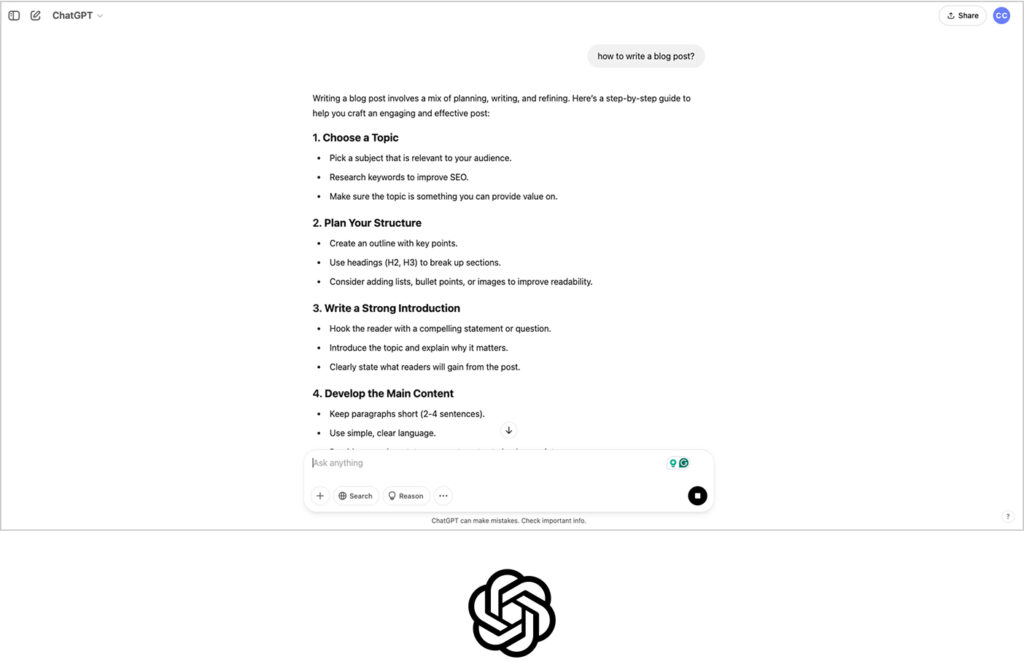
By now, many of you have probably used ChatGPT. It is one of the best AI writing tools today. It can answer questions, write and edit content, brainstorm ideas, provide recommendations, and more. For content marketers especially, it is handy for idea generation, writing assistance, SEO and keyword suggestions, proofreading and editing, research support, and content strategy. The free version also gives you limited access to the latest AI models, including GPT-4o, allowing users to leverage the latest technology without having to upgrade to a paid plan.
Pricing:
ChatGPT is free to use; however, there’s a limit to how many questions, or “queries,” you can ask within five hours. After you’ve reached your limit, ChatGPT automatically switches over to GPT-4o mini, which is still helpful but not as advanced as GPT-4o. If you need access to more queries, faster response times, or advanced AI models that understand complex questions better, you can upgrade to ChatGPT Plus for $20/month.
Chat GPT (Free Version)
Pros:
- Generates responses quickly
- Answers questions, explains concepts, and assists with learning
- Helps with writing, brainstorming, and idea generation
- Users can upload images or files in their queries
- Can analyze and extract insights from your data
- Users can create images using DALL-E
Cons:
- Occasional difficulty understanding context, especially sarcasm and humor
- Tendency to create inaccurate information or “hallucinate”
- Limited number of queries every five hours
- Slower response times compared to paid versions
- Limits on data analysis, file and image uploads, and image creation
- Less advanced processing power for complex questions
3. Notebook LMIdeal for Organization and Note-Taking
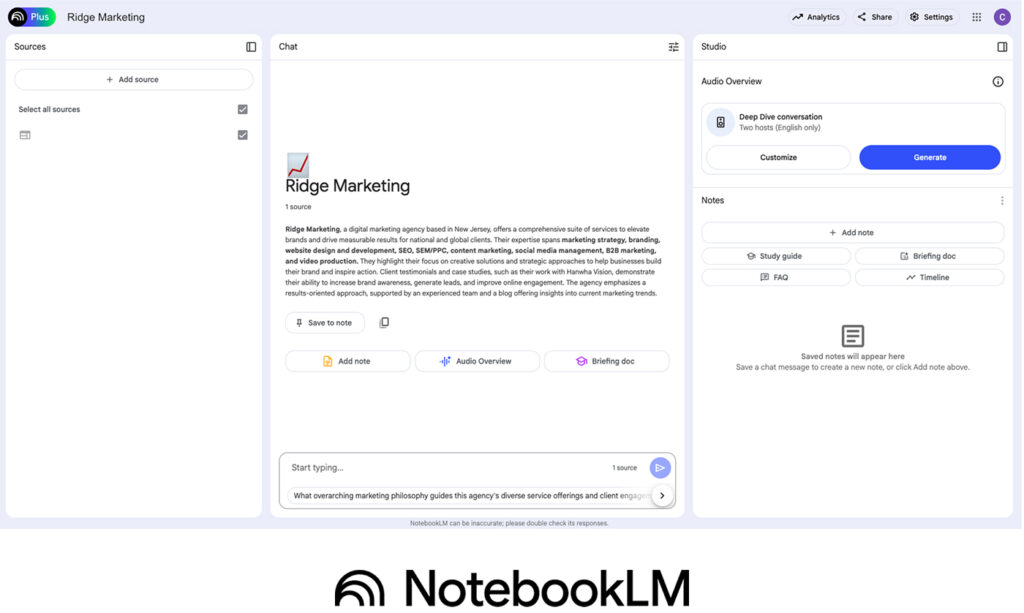
Content marketers juggle a massive amount of information between research, brainstorming notes, and content ideas. Keeping track of everything can feel overwhelming, not to mention the time it takes to consolidate everything.
Notebook LM organizes your chaos of scattered notes so you can focus on creating, not searching. Powered by Google’s Gemini 2.0, Notebook LM enables users to upload various sources, such as PDFs, websites, YouTube videos, audio files, Google Docs, and Slides. It streamlines the content creation process by generating summaries, uncovering connections between topics, and extracting key insights. The Audio Overview feature lets you create podcast-style discussions from your uploaded sources. It also provides cited responses and links directly to sources to ensure accurate and verifiable information.
Pricing:
Notebook LM is free to use, which is great if you’re an individual or new to content marketing. However, there is a Premium Plan for $19.99/month with enhanced chat settings, analytics, and access to more audio overviews, notebooks, queries, and sources per notebook.
Notebook LM (Free Version)
Pros:
- Provides basic AI-powered note-taking and research capabilities
- Offers reliable outputs based on user-uploaded sources
- Includes an audio overview feature to turn documents into podcast-style content
- Allows up to 100 notebooks with 50 sources per notebook
- Provides 50 chat queries and 3 audio generations per day
Cons:
- Restricted number of notebooks and sources
- Lower daily query and audio generation limits
- Lacks advanced chat settings
- Can’t customize how you share your notebook (i.e., chat only)
- No access to notebook analytics
4. Perplexity.AIIdeal for Web Search and Research
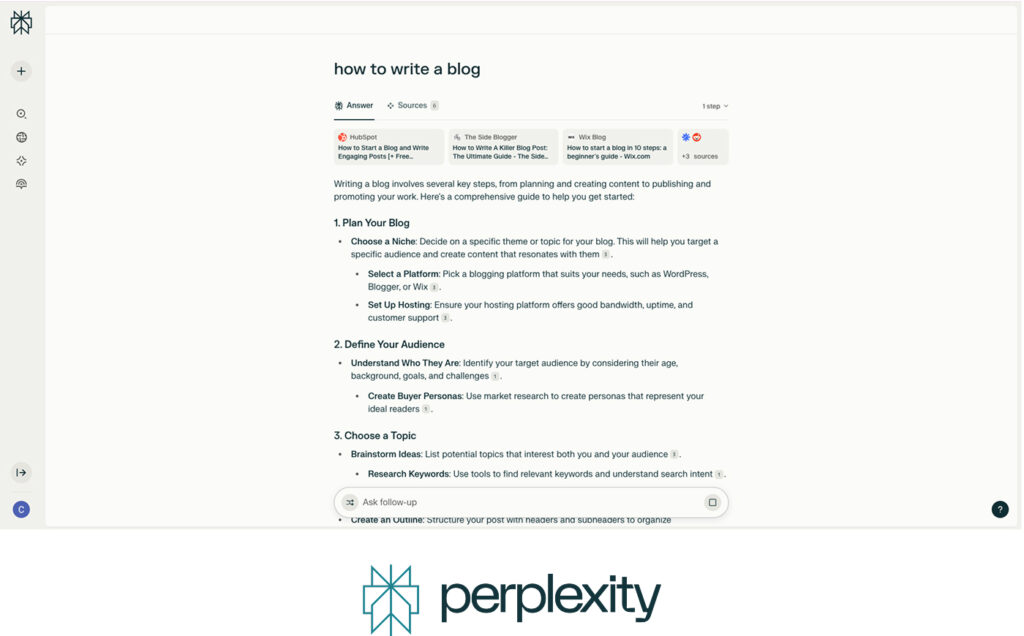
Sifting through endless search results is time-consuming, but Perplexity.AI simplifies the process. This free, AI-powered search engine delivers real-time, conversational answers with verifiable sources using advanced models such as GPT-4 Omni and Claude 3. Instead of scrolling through pages of links, Perplexity scours the web instantly, compiling clear, well-cited summaries from trusted news outlets, academic papers, and blogs. It even remembers past queries, enabling seamless, context-aware follow-ups.
Pricing:
Perplexity is free, although a Pro Version costs $20/month. With this, you’ll gain access to 300+ Pro Searches per day, unlimited file uploads, and more.
Perplexity.AI (Free Version)
Pros:
- Unlimited Quick Searches for basic queries
- 5 Pro Searches per day for more complex questions
- Access to GPT-4 Omni and Claude 3
- Ability to upload up to 3 files (images, text, PDFs) per day
Cons:
- Limited Pro Searches per day
- Restricted to using only the standard AI model
- Limited file upload capacity
- May provide less detailed or accurate responses for complex queries
5. Semrush For SEO and Topic Research
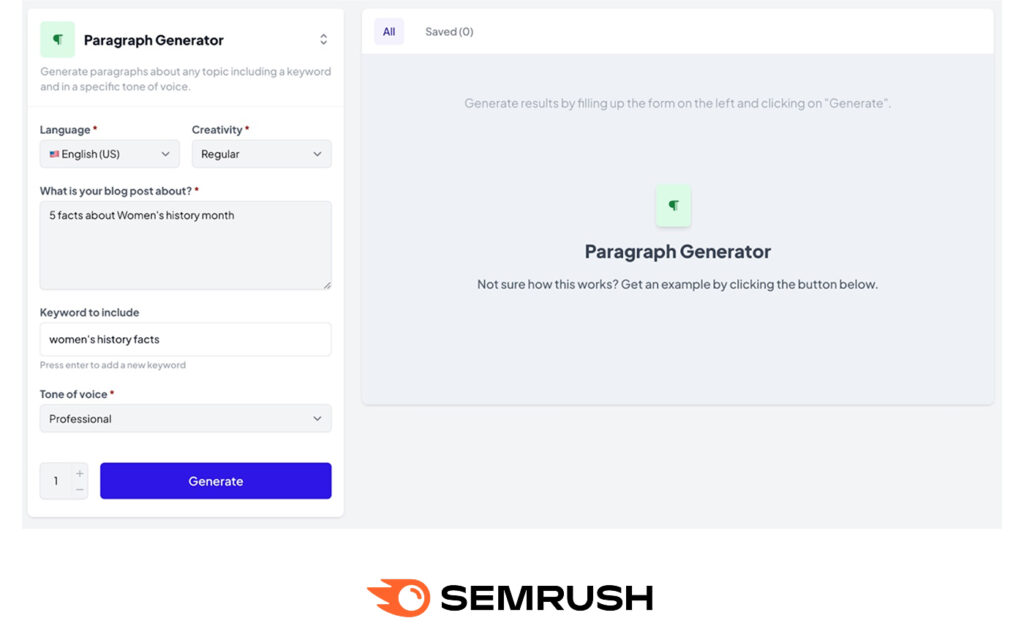
Crafting high-ranking, audience-focused content can be a challenge. Semrush’s AI-powered tools simplify the process, from brainstorming ideas to optimizing for search, saving time and eliminating guesswork.
Discover what your audience wants using the Topic Research Tool, which uncovers trending topics, headlines, and audience questions using any broad keyword or topic.
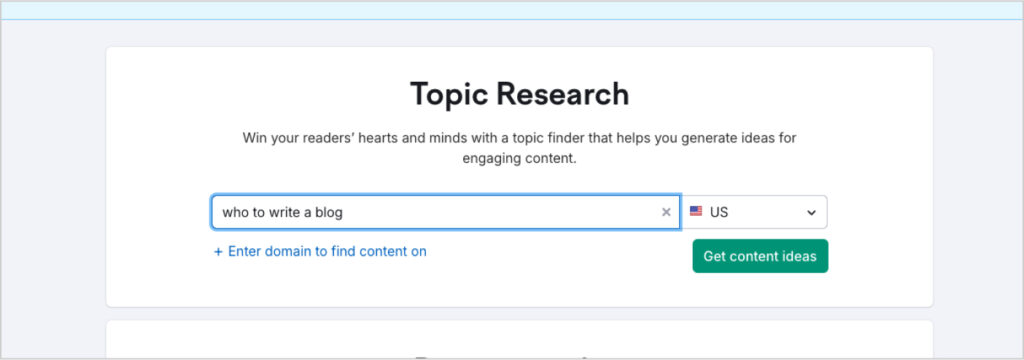
Build optimized drafts with the SEO Content Template, which provides recommended keywords, readability scores, backlink tips, and word count goals based on top competitors.
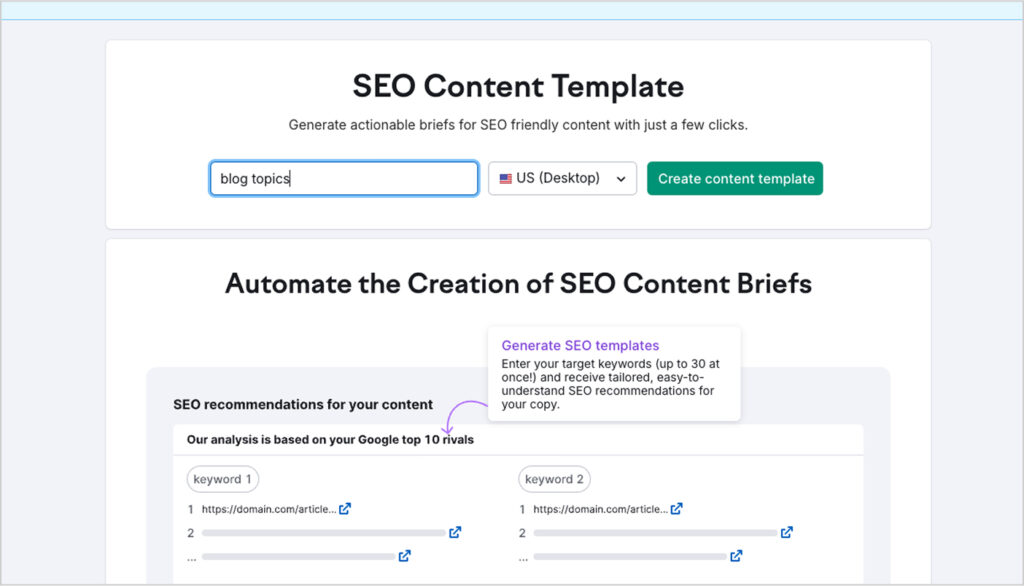
Write more confidently with the AI Writing Assistant, which optimizes content in real-time using SEO recommendations.
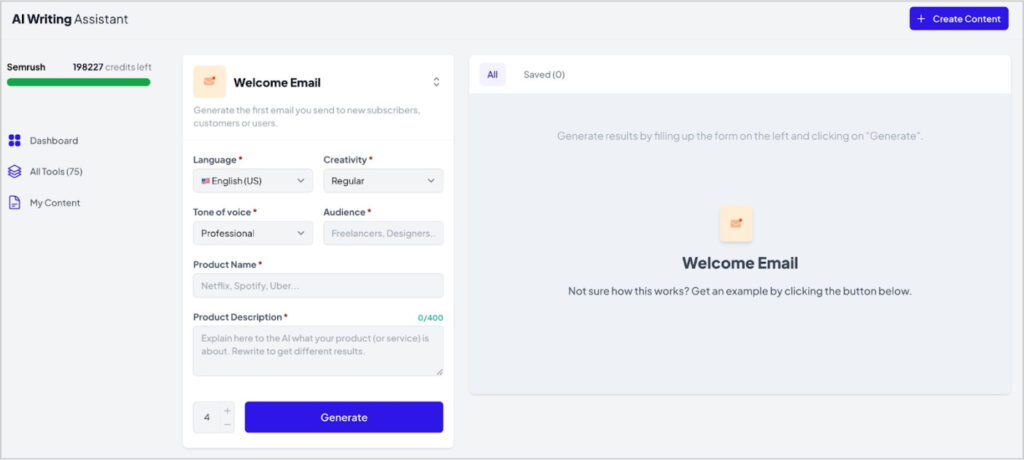
While Semrush comes with a learning curve and a higher price tag, its robust features make it a worthwhile investment for marketers who are serious about SEO and content strategy.
Pricing:
Semrush plans start at $139.95/month for individuals or small teams.
Semrush
Pros:
- Massive database of over 21.1 billion keywords
- 50+ tools covering SEO, social media, and PPC
- Generate endless content ideas
- Uncover content gaps
- Analyze competitor content strategies
- Monitor brand and content performance
- Target content with keyword intent analysis
Cons:
- Considered expensive, especially for small businesses or individual users
- Additional costs for adding more users to a plan
- Steep learning curve due to the extensive feature set
- Primarily focuses on Google Search data, lacking insights from other search engines
6. WhiskFor Image Creation:
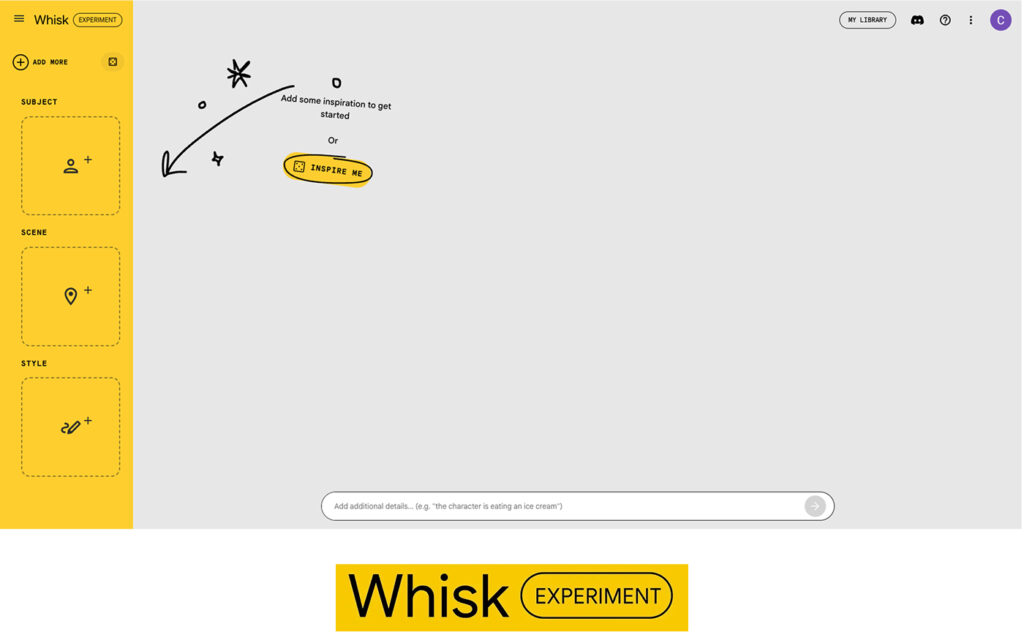
Coming up with fresh, eye-catching visuals can be one of the trickiest parts of any marketing campaign. Google Labs’ Whisk is a free AI-powered tool that turns general ideas into unique visuals in seconds. Unlike other AI image generators that rely purely on text, Whisk allows users to incorporate existing images for even more personalized results. Simply drag and drop visuals or input text to define your subject, scene, and style.
Using Gemini, Whisk generates detailed captions of the input text or images, which are then fed into Imagen 3 to produce the final artwork. Users can view and edit the underlying prompts anytime for further customization. For content marketers, Whisk eliminates creative blocks and sparks fresh ideas, ensuring you never have to stare at a blank screen waiting for inspiration to strike.
Pricing:
Whisk is free to use; a Google account is all you need to get started.
Whisk
Pros:
- Uses photos and text prompts for image generation
- Allows users to upload multiple images to define subject, scene, and style
- Simplifies the creative process for those unfamiliar with creating detailed text descriptions
- Features a drag-and-drop interface for easy use
- Provides AI-generated suggestions to use as starting points
- Encourages experimentation with remixing capabilities
Cons:
- Potential for surprising or unintended results
- Mastering the art of combining images for desired results still involves a learning curve
- Certain artistic styles or specific compositions might be difficult to achieve
AI tools have become indispensable for content marketers looking to work smarter, not harder. From grammar-checking and content ideation to SEO research and image creation, these tools have the potential to streamline workflows, enhance creativity, and improve content quality. While AI can’t replace the human touch, it can amplify efficiency and effectiveness. Integrating the right AI tools into your content strategy lets you stay ahead of the competition and produce high-quality content at scale.
Want more insights on AI? Read our other recent blogs: 5 Ways to Humanize AI-Generated Content 8 Ways to Tell if Generative AI Can Help You Produce Content
Ready to elevate your brand, engage your audience, and drive measurable growth? Contact us today to learn how our content marketing services can help you achieve your business goals.

